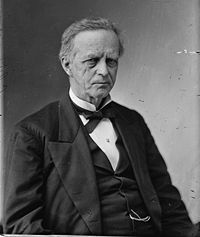Lyman Trumbull: Difference between revisions
Mike Dillon (talk | contribs) |
Provided information about Andrew Johnson's impeachment trial. |
||
| Line 24: | Line 24: | ||
By [[1840]], he was serving in the Illinois State House and was Secretary of State from [[1841]] to [[1843]]. From [[1848]] to [[1853]], he was a justice on the state Supreme Court. Although elected to the [[United States House of Representatives]] in [[1854]], he was elected to serve in the [[U.S. Senate]] before he could take his seat. He served from [[1855]] through [[1873]], during which time he claimed party affiliations with the Democrats, the Republicans, the [[Liberal Republican Party (United States)|Liberal Republicans]], and finally the Democrats again. |
By [[1840]], he was serving in the Illinois State House and was Secretary of State from [[1841]] to [[1843]]. From [[1848]] to [[1853]], he was a justice on the state Supreme Court. Although elected to the [[United States House of Representatives]] in [[1854]], he was elected to serve in the [[U.S. Senate]] before he could take his seat. He served from [[1855]] through [[1873]], during which time he claimed party affiliations with the Democrats, the Republicans, the [[Liberal Republican Party (United States)|Liberal Republicans]], and finally the Democrats again. |
||
During President [[Andrew Johnson]]'s impeachment trial, Trumbull broke party ranks, along with six other Republican senators, and in a courageous act of political suicide, voted for acquital. These seven Republican senators were disturbed by how the proceedings had been manipulated in order to give a one-sided presentation of the evidence. Senators [[William Pitt Fessenden]], [[Joseph S. Fowler]], [[James W. Grimes]], [[John B. Henderson]], Lyman Trumbull, [[Peter G. Van Winkle]] <ref> [http://law.jrank.org/pages/13490/Andrew-Johnson-Trial.html "Andrew Johnson Trial: The Consciences of Seven Republicans Save Johnson".] </ref>, and [[Edmund G. Ross]] of Kansas, who provided the decisive vote <ref> [http://www.eyewitnesstohistory.com/john.htm "The Trial of Andrew Johnson, 1868".] </ref>, defied their party and public opinion and voted against impeachment. |
|||
As chairman of the [[United States Senate Committee on the Judiciary|Judiciary Committee]] (1861-1872), he co-authored the [[Thirteenth Amendment to the United States Constitution|Thirteenth Amendment]], which prohibited all kinds of [[slavery]] in the United States. |
As chairman of the [[United States Senate Committee on the Judiciary|Judiciary Committee]] (1861-1872), he co-authored the [[Thirteenth Amendment to the United States Constitution|Thirteenth Amendment]], which prohibited all kinds of [[slavery]] in the United States. |
||
Revision as of 16:25, 17 August 2007
Lyman Trumbull | |
|---|---|
 | |
| Junior Senator, Illinois | |
| In office March 4, 1855 – March 3, 1873 | |
| Preceded by | James Shields |
| Succeeded by | Richard J. Oglesby |
| Personal details | |
| Political party | Democrat, Republican |
| Spouse(s) | Julia Maria Janyne Trumbull Mary Jane Ingraham Trumbull |
| Profession | Politician, Lawyer |
Lyman Trumbull (October 12, 1813 – June 25, 1896) was a United States Senator from Illinois during the American Civil War.

Trumbull was born in Colchester, Connecticut. He attended Bacon Academy and was a school teacher from 1829 to 1833. After studying law, he was admitted to the bar and practiced in Greenville, Georgia until moving to Belleville, Illinois in 1837.
By 1840, he was serving in the Illinois State House and was Secretary of State from 1841 to 1843. From 1848 to 1853, he was a justice on the state Supreme Court. Although elected to the United States House of Representatives in 1854, he was elected to serve in the U.S. Senate before he could take his seat. He served from 1855 through 1873, during which time he claimed party affiliations with the Democrats, the Republicans, the Liberal Republicans, and finally the Democrats again.
During President Andrew Johnson's impeachment trial, Trumbull broke party ranks, along with six other Republican senators, and in a courageous act of political suicide, voted for acquital. These seven Republican senators were disturbed by how the proceedings had been manipulated in order to give a one-sided presentation of the evidence. Senators William Pitt Fessenden, Joseph S. Fowler, James W. Grimes, John B. Henderson, Lyman Trumbull, Peter G. Van Winkle [1], and Edmund G. Ross of Kansas, who provided the decisive vote [2], defied their party and public opinion and voted against impeachment.
As chairman of the Judiciary Committee (1861-1872), he co-authored the Thirteenth Amendment, which prohibited all kinds of slavery in the United States.
In 1873, he set up a law practice in Chicago and remained in private practice except for a brief period when he ran an unsuccessful campaign for governor (as a Democrat) in 1880.
During his explorations in the west John Wesley Powell named Mt. Trumbull (and now the Mt. Trumbull Wilderness) in northwestern Arizona after the senator.
